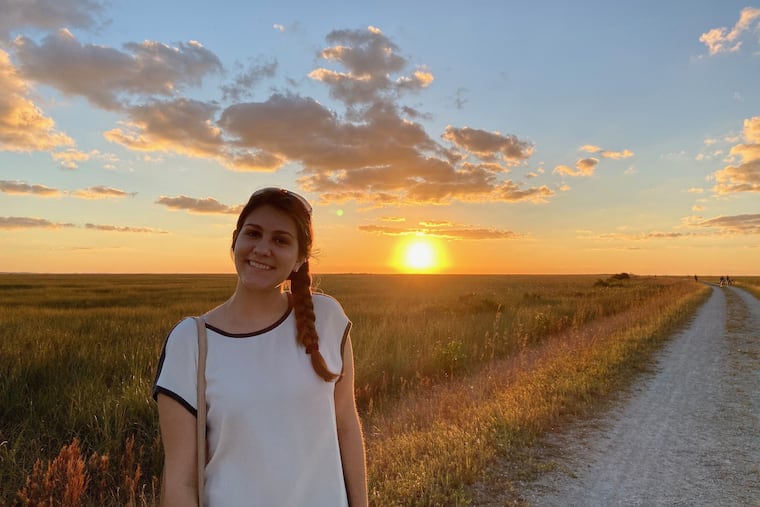These college conservatives say climate change is real. Now to convince their elders.
The American Conservation Coalition Campus acknowledges climate change is mostly caused by human activity and embraces other environmental causes. It's also spreading rapidly with chapters on 220 college campuses.

Karly Matthews, who graduated from Temple University last month with a degree in journalism, has always identified as conservative, but like most of her Gen Z peers, she also cares about the environment.
“As I got into college and got more politically active, it did honestly really bother me that [other conservatives] didn’t talk about environmental issues when it’s such a pressing topic,” Matthews said.
So she took a job with the American Conservation Coalition Campus, a nonprofit group of conservatives that acknowledges climate change is real and caused by human activity, and embraces environmental causes. But unlike more liberal environmental organizations, the group’s approach also states that natural gas and nuclear energy should be part of a climate plan.
ACC Campus has chapters at 220 colleges, including Temple.
The organization was started by Benji Backer, who graduated this year from the University of Washington with a degree in marketing, and supports free-market solutions to climate change, chiefly through technological innovation. He noted that the U.S. Environmental Protection Agency was created under Republican President Richard M. Nixon and that conservatives including President Theodore Roosevelt long embraced environmental issues.
For younger conservatives, he said, there is no “disbelief” that humans are having an impact on the climate.
“We’re trying to fix the generational divide,” Backer said last week.
“The only solutions that have been proposed are ones that are, you know, very left to center,” Backer said. “But it also falls on the right to come up with solutions.”
In mid-June, ACC Campus launched a weeklong ad run on Fox News to nudge the Trump administration and Congress to make “conservation and energy innovation a critical part of any post-COVID-19 recovery package.”
A recent Pew Research Center report shows millennial and Gen Z Republicans, ages 18 to 39, have differing opinions from older Republicans on key issues related to climate, environmental protection, and energy production.
Younger Republicans are more likely than older ones to believe human activity is a cause of climate change. A bigger share of younger Republicans believes the government is doing too little to protect water and air quality, animal habitats, and open lands in national parks. And younger Republicans are also more apt than older ones to say the nation should prioritize developing alternative energy sources over expanding the production of fossil fuels.
“The environment is something that I have felt passionately about since my youth,” Backer said. “I grew up going to a really tranquil lake in the Northwest, in Wisconsin. I moved to Seattle for school because I wanted to be somewhere where I could hike because the environment is really where I feel the best.”
Backer, who has referred to himself as a “Never Trump” conservative, said he found it frustrating talking to conservatives about environmental issues. So he started ACC Campus and aims for bipartisanship. He said conservatives skeptical about climate change often change their minds when told there might be free-market solutions.
“For us in terms of energy, that can mean any technology within any industry that helps reduce emissions,” Backer said. “And that could be wind and solar.... We realize that, especially in certain states including Pennsylvania, fossil fuels are an important part of the economy, and that’s not going to change overnight.”
ACC Campus has a climate contract that calls for innovation in energy and new infrastructure while acknowledging an ”undeniable link between human activity, particularly greenhouse gas emissions, and climate change.“
Natural gas produces far less carbon dioxide, the chief greenhouse gas, than coal-fired power plants. But most environmentalists are critical of pipelines and the chemicals used in fracking. They also are concerned about methane, a greenhouse gas that can leak during operations.
On Tuesday, House Democrats unveiled a sweeping climate action plan that calls for net-zero carbon emissions by 2050. The plan does not explicitly call for an end to fracking, but it does call for cutting methane pollution emitted during the process. It also recommends “next generation nuclear” and carbon capture technology.
ACC Campus is affiliated with the American Conservation Coalition, whose advisory board includes representatives of high-profile environmental groups, such as the Audubon Society, but also includes others with past affiliations to climate-denial groups. Backer said those board members now acknowledge the impact humans have on climate change.
Matthews, the Temple grad, joined ACC Campus in 2018 and has “always identified myself as right of center.”
“I think a lot of times, especially with young conservatives, it’s not that we don’t care about the environment. But we’re kind of in this place where we think there’s a choice between economic prosperity and addressing environmental concerns like climate change.”
She said hearing there could be a link between economics and conservation “was a light-bulb moment for me.”
Matthews, who is not a supporter of President Donald Trump or Joe Biden, said conservatives are responsive to that message.
Divya Jain, a senior chemistry major at Pennsylvania State University, is co-president of the campus group Eco Action and said “it’s absolutely great” that ACC Campus recognizes climate change. But she is not a supporter of natural gas as part of a clean climate plan.
Nevertheless, she said there’s a role for conservatives in the overall discussion on climate change.
“Climate change will impact not just Democrats, but also Republicans,” Jain said. “So it’s important to get people on both sides of the aisle on board.”